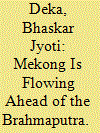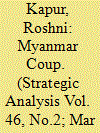| Srl | Item |
| 1 |
ID:
186354


|
|
|
|
|
| Summary/Abstract |
This article analyses the hydro-political behaviour of riparian countries in the Mekong River Basin (MRB) vis-à-vis India’s attitude towards the Brahmaputra and upstream China. It analyses transboundary water cooperation in the MRB and the active participation of the stakeholders and then compares it with the Brahmaputra River Basin (BRB). It argues that the water management practices in the MRB are comparatively more ‘effective’ while the BRB is receding in this regard. It analyses various aspects of promoting the North East Region (NER) as a paradiplomatic agent in the BRB in a way Yunnan is performing in the MRB.
|
|
|
|
|
|
|
|
|
|
|
|
|
|
|
|
| 2 |
ID:
186355


|
|
|
|
|
| Summary/Abstract |
Myanmar has been in a turmoil since the Tatmadaw (country’s military) ousted Aung San Suu Kyi’s government and seized power in February 2021.1 The coup took place hours before the new parliament could convene following the 2020 general elections. The junta has detained her since then and reimposed military rule after running a short experiment under a power-sharing arrangement with the National League for Democracy (NLD).2 There are concerns that Myanmar could morph into another Syria with widespread displacement and hunger, aggravated by the COVID-19 pandemic. This commentary explores the sustained crackdown by the junta, the painstaking efforts undertaken by the ousted government to remain relevant domestically and gain legitimacy abroad, how the Tatmadaw is currently fighting a multi-front war in several areas of the borderlands, the adoption of violent tactics by members of the civil disobedience movement and ASEAN’s inability to find a permanent solution to the worsening crisis in Myanmar.
|
|
|
|
|
|
|
|
|
|
|
|
|
|
|
|
| 3 |
ID:
186357


|
|
|
|
|
| Summary/Abstract |
Despite looming threats of US sanctions, India has received the first of five S-400 air defence weapon systems from Russia. It will be interesting to see how this deal will affect India’s relationship with the US. Will the US impose sanctions as it has done on other countries dealing with Russia or will it choose to spare India, looking at the balance of power in the South Asian region and counter China’s increasing hegemony in the region? The US so far remains non-committal on whether it will waive sanctions on India under CAATSA. Moreover, will India’s affinity towards Russia result in stronger Indo-Russian relations than they have been in the past decade? This commentary will try and analyse India’s, US’, and Russia’s stand along with their reasoning behind taking that stand. It will also touch upon the relationship dynamics of all these countries with China and how this dynamic will have a significant impact in South Asia.
|
|
|
|
|
|
|
|
|
|
|
|
|
|
|
|
| 4 |
ID:
186353


|
|
|
|
|
| Summary/Abstract |
Despite being a key stakeholder in the emerging regional order, South Korea’s approach to the Indo-Pacific has been a policy of ‘strategic ambiguity’. It entails a cautious engagement with Indo-Pacific initiatives of different countries under the ambit of ‘New Southern Policy’ without endorsing the concept or articulating the Korean position on the Indo-Pacific regional construct. Explaining the Korea’s strategic outlook, this article argues that its ambiguous approach to the Indo-Pacific’ is determined by the prioritization of maintaining a ‘balanced diplomacy’ in its relations with the US and China in a context of intensified strategic competition between the two.
|
|
|
|
|
|
|
|
|
|
|
|
|
|
|
|
| 5 |
ID:
186351


|
|
|
|
|
| Summary/Abstract |
This article deals with the Russian Revisionist Strategy, the redistribution of power and the changes that this policy might bring. Accordingly, it examines whether this hypothesis is correct. NATO’s policy and the wars in Crimea, Georgia, Syria and the current one in Ukraine are the case studies that the article analyses. It discusses how Russia aims to restructure the regional and global system by forming strategic arcs and ‘pincer movements’ from the North Sea to the Middle East via the Caucasus Region. The war in Ukraine is at the epicentre of the Russian revisionist strategy.
|
|
|
|
|
|
|
|
|
|
|
|
|
|
|
|
| 6 |
ID:
186352


|
|
|
|
|
| Summary/Abstract |
The debate on the epistemological significance of leadership versus domestic politics or strategic culture remains fervent in modern International Relations. We suggest that there is a consensus found in classical Greek and Chinese texts about the core elements of realism and the consequentiality of political leadership on strategic choice. By engaging in a comparative study of strategic concepts emanating from pre-Qin China and Classical Greek strategic texts (which were developed independently into two closed hegemonic systems), we argue that the strategic logics of the West and East attest to the existence of a universal canon of strategy, one that places a premium on political leadership. Moreover, a shared intercultural strategic doctrine acknowledges the importance of utilitarian morality in politics, a consequentiality embedded within the structural restrictions of the interstate system and the constancy of human nature.
|
|
|
|
|
|
|
|
|
|
|
|
|
|
|
|
| 7 |
ID:
186356


|
|
|
|
|
| Summary/Abstract |
After the Taliban successfully took control of Kabul through diplomatic and intimidatory means, which included using force and striking deals with warlords and local military commanders, it has reached out to other states for recognition.1 The Taliban realizes that without international recognition it would be difficult to achieve both domestic and international legitimacy. Recognition by the international community would help the Taliban to access around $9.5 billion in frozen reserves held overseas, which could help ease the current cash crunch that the Taliban regime is facing in Afghanistan.
|
|
|
|
|
|
|
|
|
|
|
|
|
|
|
|